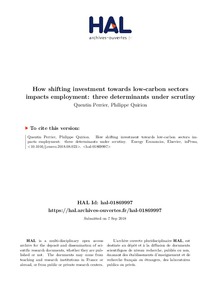How shifting investment towards low-carbon sectors impacts employment: three determinants under scrutiny
"The threat of climate change requires redirecting investment towards low-carbon sectors, and this shift generates heated debates about its impact on employment. Many studies exist, most of which use CGE or Input-Output (IO) models. However, the economic mechanisms at play remain unclear. This...
| Main Authors: | , |
|---|---|
| Institution: | ETUI-European Trade Union Institute |
| Format: | TEXT |
| Language: | English |
| Published: |
Villeurbanne
2018
HAL-SHS |
| Subjects: | |
| Online Access: | https://www.labourline.org/KENTIKA-19303664124911218469-How-shifting-investment-toward.htm |
| _version_ | 1771659901725048832 |
|---|---|
| author | Perrier, Quentin Quirion, Philippe |
| author_facet | Perrier, Quentin Quirion, Philippe |
| collection | Library items |
| description | "The threat of climate change requires redirecting investment towards low-carbon sectors, and this shift generates heated debates about its impact on employment. Many studies exist, most of which use CGE or Input-Output (IO) models. However, the economic mechanisms at play remain unclear. This paper disentangles the channels of job creation and studies to what extent the results of simpler IO models diverge from CGE results. Using stylized models, we show that a shift in investment creates jobs in IO if it promotes sectors with a higher share of labour in value added, lower wages or a lower import rate. In CGE, the first two channels also yield job creation, but there is no positive impact of targeting low-imports sectors-unless these do not export. Then we undertake a numerical analysis of two policies: the installation of solar panels and weatherization in France. Both policies have a positive effect on employment, in both models, due to the high share of labour and low wages in these sectors. IO results provide a good approximation of CGE results for solar (-14% to +34%) and are slightly higher for weatherization (+22% to +87%). Our findings challenge the idea that renewables boost employment by reducing imports , but they also suggest that a double dividend can be achieved by encouraging low-carbon labour-intensive sectors." |
| format | TEXT |
| geographic | France |
| id | 19303664124911218469_f32b6620711842d8931572031ec6a0cf |
| institution | ETUI-European Trade Union Institute |
| is_hierarchy_id | 19303664124911218469_f32b6620711842d8931572031ec6a0cf |
| is_hierarchy_title | How shifting investment towards low-carbon sectors impacts employment: three determinants under scrutiny |
| language | English |
| physical | 41 p. Digital |
| publishDate | 2018 |
| publisher | Villeurbanne HAL-SHS |
| spellingShingle | Perrier, Quentin Quirion, Philippe renewable resources climate change employment employment creation investment How shifting investment towards low-carbon sectors impacts employment: three determinants under scrutiny |
| thumbnail | https://www.labourline.org/Image_prev.jpg?Archive=136975795415 |
| title | How shifting investment towards low-carbon sectors impacts employment: three determinants under scrutiny |
| topic | renewable resources climate change employment employment creation investment |
| url | https://www.labourline.org/KENTIKA-19303664124911218469-How-shifting-investment-toward.htm |

